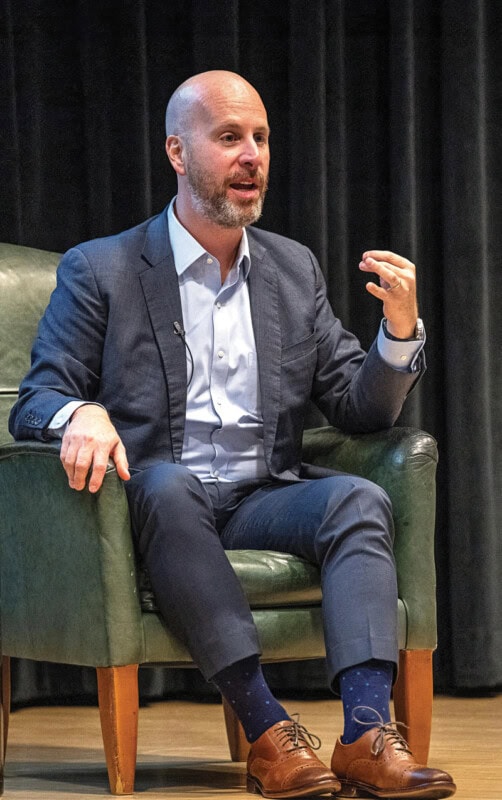Former editor of the Jerusalem Post and senior fellow at the Jewish People’s Policy Institute, Yaakov Katz returned to Tidewater on Thursday, October 23 to discuss Israel’s Blind Spot – Understanding Hamas. The evening’s conversation was based on Katz’s recent book, While Israel Slept: How Hamas Surprised the Most Powerful Military in the Middle East. The book is co-authored with Amir Bohbat, a lecturer at Ben Gurion University of the Negev and a military and defense correspondent for Walla. Katz spoke to a packed room at the Sandler Family Campus.
This event kicked off this year’s Lee and Bernard Jaffe Family Jewish Book Festival, presented as part of the Jewish Community Relations Council of the United Federation of Tidewater, Simon Family JCC, and Community Partners’ 15th Annual Israel Today series.
The discussion was moderated by David Brand, a UJFT past president and a member of the Attorney General of Virginia’s Task Force to Combat Antisemitism as Special Advisor for Outreach. Brand opened the conversation by highlighting five key areas of focus for the evening:
1. The lead up to October 7, 2023 – including failures of intelligence gathering, the Jericho Wall, and policies of containment or “kicking the can down the road” regarding Hamas.
2. Fauda – chaos at the Kirya, missed warnings, and internal dysfunction within Israeli leadership.
3. IDF operations into Gaza.
4. Recommendations for future Israeli security, including intelligence reform and strengthening national resilience.
5. Accountability – an investigation.
Within each of these areas, Katz examined a few of Israel’s blind spots and miscalculations. He discussed the observations made by the tatzpitaniyot—the observation unit composed primarily of young female IDF soldiers—who reported increasing Hamas activity along the southern Israeli border with Gaza that was dismissed by their military officers. Tragically, most of these soldiers were among the first victims, brutally killed during the initial Hamas attack on October 7.
Katz also highlighted the vast network of Hamas tunnels beneath Gaza, questioning whether Israel should have acted earlier to destroy them, as proposed by then-Defense Minister Avigdor Lieberman in 2018. The Israeli cabinet, including Prime Minister Benjamin Netanyahu, ultimately rejected Lieberman’s proposal, prompting Lieberman’s resignation.
He explored the impact of Netanyahu’s proposed judicial reforms in 2023 and the widespread protests that followed, events that in Katz’s view, as a nation divided, left Israel more vulnerable to Hamas and other enemies. A significant number of senior officers and reservists joined the protests, with some threatening to refuse military service in opposition to the reforms. Katz also described the chaos within the Kirya, Israel’s defense headquarters, as the events of October 7 unfolded, noting Netanyahu’s hesitation to use force and the absence of an operational plan for Gaza—both before 2023 and for the “day after” the attacks.
An engaging and commanding speaker, Katz does not mince words. His conversational style with David Brand captured the audience’s attention. Katz clearly stated that Netanyahu prioritized his political future over Israel’s security needs. Both Katz and co-author Bohbot challenged accusations from human rights organizations and the international community that the IDF has been indifferent to Palestinian civilian casualties, when in fact, in Katz’s view, the larger story is the tragedy of Gaza itself—a place where Hamas embedded itself in every home, built tunnels beneath schools and hospitals, radicalized and terrorized the civilian population, and held the hostages (men, women, and children) in its tunnels. He shared that Hamas’s strategy of using human shields is a deliberate tactic intended to increase civilian casualties and provoke a backlash against Israel.
During the question and answer period, two questions stood out. The first concerned Katz’s view on U.S.-Israel relations. “When the United States is seen as strong and engaged with Israel, then Israel is strong,” he replied. Katz responded to the second question, “What keeps you up at night?” with “the future of a strong Israel depends on intelligence and military reform as identified during the initial 10/7 attack and during the war, a robust U.S.-Israel alliance, improved public diplomacy, a clear exit strategy for Gaza, and the strengthening of national unity and resilience.”
To learn more about UJFT’s Jewish Community Relations Council, Simon Family JCC, all area synagogues, and Community Partners’ 15th Annual Israel Today Series, visit JewishVA.org/IsraelToday or contact Nofar Trem, UJFT’s Israel Engagement manager at NTrem@ujft.org.
To learn more about United Jewish Federation of Tidewater and Simon Family JCC’s Lee and Bernard Jaffe Family Jewish Book Festival, which continues through December 11, visit JewishVA.org/BookFest.
Barbara Dudley is chair, Jewish Community Relations Council of the United Jewish Federation of Tidewater.


